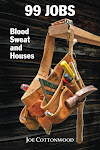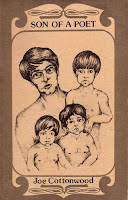My House Was Always WetFaucets dripped.
Gutters overflowed.
The old roof, Vermont slate, leaked.
The two toilets, mysterious machines,
whistled, gurgled, clunked in the night.
Drains backed up with smelly gray suds.
Cellar walls wept.
Water
never slept.
If I took a shower upstairs,
downstairs a waterstain
grew on Gramma's ceiling.
Once after an extra long shower
("What were you
doing in that shower, boy?")
Gramma's ceiling
collapsed.
My father was no plumber.
Once he broke a china sink.
Ripped a hole in a bedroom wall,
then didn't come home at all, at all.
Doors grew mildew, ceilings grew mold.
Floor joists quietly rotted.
My own sprouting body grew fungus
in places I didn't dare mention.
Sister moved across the sea;
Brother, to the coast;
Gramma, to the hospital
and then gave up the ghost.
I, too, traveled far
though moisture haunted
my every move:
sweating palms,
saliva of lips,
teardrops and their salty tracks,
juice of genitals, flood of birth,
milk of breast . . . The house
was leaking love, my friend,
and no pipe ever
brought it back.

© Joe Cottonwood 2009
(This poem appeared in slightly different form in my book
Son of a Poet, published in 1986)














































